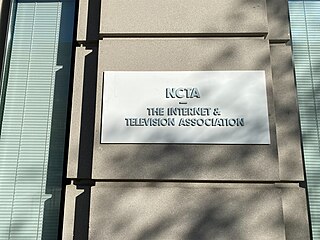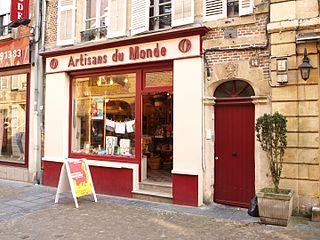
Fair trade is a term for an arrangement designed to help producers in developing countries achieve sustainable and equitable trade relationships. The fair trade movement combines the payment of higher prices to exporters with improved social and environmental standards. The movement focuses in particular on commodities, or products that are typically exported from developing countries to developed countries but are also used in domestic markets, most notably for handicrafts, coffee, cocoa, wine, sugar, fruit, flowers and gold.

Worldshops, world shops or Fair Trade Shops are specialized retail outlets offering and promoting Fair Trade products. Worldshops also typically organize various educational Fair Trade activities and play an active role in trade justice and other North-South political campaigns.
A trade association, also known as an industry trade group, business association, sector association or industry body, is an organization founded and funded by businesses that operate in a specific industry. Through collaboration between companies within a sector, a trade association participates in public relations activities such as advertising, education, publishing and, especially, lobbying and political action. Associations may offer other services, such as producing conferences, setting industry standards, holding networking or charitable events, or offering classes or educational materials. Many associations are non-profit organizations governed by bylaws and directed by officers who are also members.. Many associations are non-profit organizations governed by bylaws and directed by officers who are also members..
UNI Global Union, formally Union Network International (UNI), is a Global Union Federation for the skills and services sectors, uniting national and regional trade unions. It has affiliated unions in 150 countries representing 20 million workers. The Global headquarters is in Nyon, Switzerland. UNI Global Union ratified over 50 Global Framework Agreements with multinational corporations including ABN AMRO, Carrefour, H&M, DHL, Telefonica, BNP Orange and Banco de Brazil, Inditex Group, Kimberly Clark among others as of 2021.

The European Trade Union Confederation (ETUC) is the major trade union organisation representing workers at the European level. In its role as a European social partner, the ETUC works both in a consulting role with the European Commission and negotiates agreements and work programmes with European employers. It coordinates the national and sectoral policies of its affiliates on social and economic matters, particularly in the framework of the EU institutional processes, including European economic governance and the EU Semester.

The Fair Trade Towns campaign is the result of a grass-roots citizens movement that started in the UK in 2001. It allows citizens to get together in order to self-proclaim their town as a region that complies with a few general Fair Trade criteria, that can be adapted from country to country but which retain their main elements.

The World Fair Trade Organization (WFTO) is the global community and verifier of enterprises that fully practice Fair Trade. It is an association of small and medium sized enterprises (SMEs), farmers or retailers that fully practice the 10 Principles of Fair Trade. They also advocate for fundamental change in our current economic system.

The Campaign Against Arms Trade (CAAT) is a UK-based campaigning organisation working towards the abolition of the international arms trade. It was founded in 1974 by a coalition of peace groups. It has been involved in several high-profile campaigns, including a legal challenge against the Serious Fraud Office's decision to suspend a corruption investigation into BAE Systems in 2007. On 27 September 2012, it was honoured with a Right Livelihood Award for its "innovative and effective campaigning".

NCTA, formerly known as the National Cable & Telecommunications Association (NCTA), is a trade association representing the broadband and cable television industries in the United States. As of 2011, NCTA represented more than 90% of the U.S. cable market, over 200 cable networks, and various equipment suppliers and service providers to the cable industry.

The World Association of Newspapers and News Publishers (WAN-IFRA) is a non-profit, non-governmental organization made up of 76 national newspaper associations, 12 news agencies, 10 regional press organisations, and many individual newspaper executives in 100 countries. The association was founded in 1948, and, as of 2011, represented more than 18,000 publications globally.
FINE is an informal association of the four main fair trade networks: Fairtrade Labelling Organizations International (FLO), International Fair Trade Association, Network of European Worldshops (NEWS!) and European Fair Trade Association (EFTA) that was created in 1998. The name FINE is an acronym consisting of the first letter of the name of each of the four member organizations.
The European Fair Trade Association (EFTA) is a Dutch association established informally in 1987. It gained formal status in 1990. It regroups 11 fair trade importers in 9 European countries: Austria, Belgium, France, Germany, Italy, Netherlands, Spain, Switzerland and the United Kingdom. EFTA members include Ctm altromercato, Gepa3 Fair Handelshaus and Traidcraft. EFTA's aim is to support its member organizations in their work and encourage cooperation and coordination.

The Fair Trade Association of Australia and New Zealand is a member-based organization that supports two systems of fair trade. The first is the Australia and New Zealand member of FLO International, which unites Fairtrade producer and labeling initiatives across Europe, Asia, Latin America, North America, Africa, Australia and New Zealand. The second is the World Fair Trade Organization (WFTO), of over 450 worldwide members, to which the Fair Trade Association is one. Fairtrade refers to FLO certified commodity and associated products. Fair trade encompasses the wider Fair Trade movement, including the Fairtrade commodities and other artisan craft products.
The Coalition for the International Criminal Court (CICC) is an international network of NGOs, with a membership of over 2,500 organizations worldwide advocating for a fair, effective and independent International Criminal Court (ICC). Coalition NGO members work in partnership to strengthen international cooperation with the ICC; ensure that the court is fair, effective and independent; make justice both visible and universal, and advance stronger national laws that deliver justice to victims of war crimes, crimes against humanity and genocide. The CICC Secretariat is hosted by the Women's Initiative for Gender Justice and it is based in The Hague.
The fair trade movement has undergone several important changes like the operation for ten thousand villages to open their businesses since early days following World War II. Fair trade, first seen as a form of charity advocated by religious organizations, has radically changed in structure, philosophy and approach. The past fifty years have witnessed massive changes in the diversity of fair trade proponents, the products traded and their distribution networks.
The Fair Trade Federation (FTF) is a nonprofit trade association that provides support to and promotes North American businesses that they identify as being fully committed to the principles of fair trade. In this vein, it describes itself as "part of the global fair trade movement, promoting a system that aims to pay fair wages and create long-term, direct trading relationships based on dialogue, transparency, equity and respect."

Fern is a Dutch foundation created in 1995. It is an international Non-Governmental Organization (NGO) set up to keep track of the European Union's (EU) involvement in forests and coordinate NGO activities at the European level. Fern works to protect forests and the rights of people who depend on them.

Artisans du monde is a French network of local fair trade associations, currently the most important non-profit fair trade movement in France. The first associations were founded in 1974, and their number then increased to reach 170 today. Most of them manage local fair trade shops, but their tasks include also awareness raising activities, and educational interventions in schools.

OpenMedia is a Canadian non-partisan, non-profit advocacy organization working to encourage open and innovative communication systems within Canada. Its stated mission is "to advance and support a media communications system in Canada that adheres to the principles of access, choice, diversity, innovation and openness." The organization employs online campaigns, participatory events, school presentations and workshops. Its online petition for the "StopTheMeter.ca" campaign became the largest online appeal of its kind in Canadian history. In 2013, OpenMedia launched campaigns aimed at ensuring accountability in the Canadian government's surveillance activities.
Sustainable products are products either sustainably sourced, manufactured or processed and provide environmental, social, and economic benefits while protecting public health and the environment throughout their whole life cycle, from the extraction of raw materials to the final disposal.












